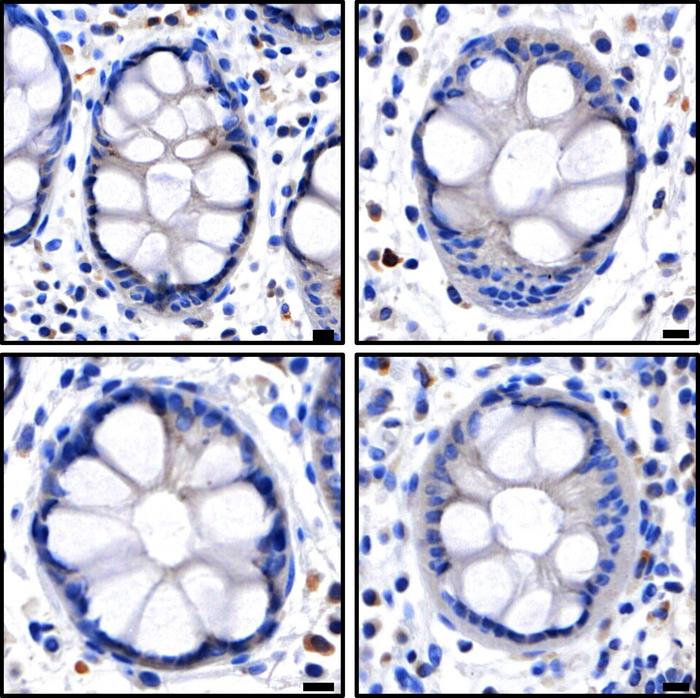Fully automated diagnostic techniques, including liquid handling robots, are poised to improve the lives of millions of people living with inflammatory diseases worldwide.

Credit: WEHI
Fully automated diagnostic techniques, including liquid handling robots, are poised to improve the lives of millions of people living with inflammatory diseases worldwide.
A landmark WEHI study has revealed new methods in detecting necroptosis, a key factor in many inflammatory diseases like psoriasis, arthritis and inflammatory bowel disease.
The findings mark a huge leap forward in our ability to diagnose necroptosis accurately. They also offer practical methods that can be easily reproduced in hospitals worldwide, giving hope for new ways to treat inflammatory diseases.
At a glance
- Necroptosis is a form of cell death, one of the body’s natural processes for removing unwanted or dangerous cells. In some people this process can go awry and trigger disease.
- Researchers have developed a set of automated techniques to pinpoint when and where necroptosis happens in patients.
- The findings could lead to better diagnosis and personalised treatments for numerous inflammatory diseases.
Catching the cell death ‘culprit’
Necroptosis, a type of cell death associated with inflammation, has long been suspected as the ‘culprit’ driving many debilitating diseases associated with gut, skin, and lung conditions. However, identifying which cells undergo necroptosis in real-life situations has been difficult.
WEHI’s Dr Andre Samson, co-leader of the study, said the findings had cracked a challenging and hotly debated area of science.
“It is so exciting to finally be able to catch necroptosis in the act,” Dr Samson said.
The new methods precisely located necroptosis in patients with ulcerative colitis or Crohn’s disease, providing critical insights into how this cell death process contributes to various inflammatory diseases.
The findings further revealed that necroptosis responds not just to inflammation, but also to bacterial changes or immune issues.
“Among other results, we also found that when proteins like Caspase-8 cluster together in cells, it’s a sign of necroptosis,” Dr Samson said.
“This is a major leap forward in our journey to eventually delivering new medicines that can treat a long list of inflammatory diseases by stopping necroptosis.
“It helps us understand when and where necroptosis happens, both in healthy and disease situations.”
Diversity delivers
The study involved a meticulous and painstaking process of optimising over 300 different experimental conditions to arrive at a set of reliable robotic methods.
Study co-leader and WEHI Inflammation division head, Professor James Murphy, said a ‘perfect trio’ was behind the groundbreaking results – decades of tireless cell death research, cutting edge technology and a brilliant global team.
“We used multiple techniques, including state-of-the-art spatial transcriptomics to scrutinise and verify our results,” Prof Murphy said.
“The size and diversity of the team was also noteworthy and critical to uniting invaluable perspectives and expertise.”
The team included three PhD students – Shene Chiou, Aysha Al-Ani and Wayne Cawthorne – six departments from WEHI, spanning disciplines from advanced imaging to genomics, plus collaborators including gastroenterologists from the Royal Melbourne Hospital and bioinformaticians from Cornell University in New York.
Lifesaving atlas for the future
The research opens new windows to understanding the intricate mechanisms of cell death and its connection to inflammatory diseases.
The team behind the study referred to their work as an “atlas of necroptosis” because it provides a precise map of which cells in the body are capable of undergoing necroptosis.
“We can now confidently visualise where and when necroptotic cell death can happen in the body,” said Prof Murphy.
In the spirit of collaboration, Prof Murphy emphasised that a key goal of the study was to discover a solution that could be easily replicated in both the laboratory and clinical settings.
“Most importantly, researchers and clinicians around the world will now be able to use these new methods, especially as liquid handling robots for immunostaining are common in hospitals and pathology departments worldwide,” he said.
“The next phase is to use these robotic methods to advance our understanding of which diseases could benefit from medicines that block necroptosis.”
The successful development of these automated methods to detect necroptosis in patients is just the beginning. The research team plans to extend their techniques to investigate other gut diseases, such as coeliac disease, and a broader range of inflammatory conditions of the skin, lung and kidney.
The study “An immunohistochemical atlas of necroptotic pathway expression” is now published in EMBO Molecular Medicine (DOI: 10.1038/s44321-024-00074-6).
The research was supported by the National Health and Medical Research Council, the Kenneth Rainin Foundation, Anaxis Pharma and in collaboration with the Royal Melbourne Hospital and Cornell University.
Journal
Molecular Medicine
Method of Research
Observational study
Subject of Research
Human tissue samples
Article Title
An immunohistochemical atlas of necroptotic pathway expression
Article Publication Date
15-May-2024



